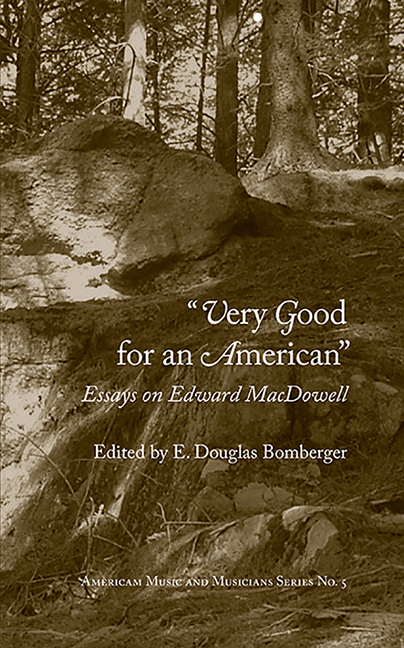Book contents
- Frontmatter
- Table of Contents
- Illustrations
- Contributors
- Acknowledgments
- Introduction: MacDowell at 150
- Edward MacDowell and the Society of Friends
- Historical Concerts in New York City, 1860-1876: An Approximation
- “No MacDowell, No Carreño”: Teresa Carreño's Contributions to the Dissemination of Edward MacDowell's Piano Music
- MacDowell, Liszt, and the Symphonic Tone Poem
- Wagnerian Influence and Motives in the Works of Edward MacDowell
- “On Sundays there was the music …” George Whitefield Chadwick between symphony and organ
- MacDowell vs. Butler: The “Idealist” Professor and the Administrator of “Materialism”
- Parallels in the Careers of Edward A. MacDowell and Chou Wen-chung
- American Bayreuth: The 1910 Peterborough Pageant and the Genesis of the MacDowell Colony
- Selective Bibliography
- Index
MacDowell, Liszt, and the Symphonic Tone Poem
- Frontmatter
- Table of Contents
- Illustrations
- Contributors
- Acknowledgments
- Introduction: MacDowell at 150
- Edward MacDowell and the Society of Friends
- Historical Concerts in New York City, 1860-1876: An Approximation
- “No MacDowell, No Carreño”: Teresa Carreño's Contributions to the Dissemination of Edward MacDowell's Piano Music
- MacDowell, Liszt, and the Symphonic Tone Poem
- Wagnerian Influence and Motives in the Works of Edward MacDowell
- “On Sundays there was the music …” George Whitefield Chadwick between symphony and organ
- MacDowell vs. Butler: The “Idealist” Professor and the Administrator of “Materialism”
- Parallels in the Careers of Edward A. MacDowell and Chou Wen-chung
- American Bayreuth: The 1910 Peterborough Pageant and the Genesis of the MacDowell Colony
- Selective Bibliography
- Index
Summary
The symphonic poem, as a genre, had a fitful beginning. As Hugh MacDonald notes, it grew out of such programmatic overtures as Beethoven's Leonore, and Berlioz's Rob Roy and Le Roi Lear overtures. He suggests that Mendelssohn's Die schöne Melusine and Die Hebriden are “direct prototypes of the Lisztian symphonic poem.” While some of Mendelssohn's overtures have programs, they are regarded primarily as concert overtures. And as we now know, the first versions of many of Liszt's symphonic poems were conceived as overtures as well; the final versions of most of the symphonic poems, as well as the Faust and Dante symphonies, date from his Weimar years, 1848 to 1858.
Because Liszt was seen as a radical avant-garde composer, the symphonic poem genre was not, in general, favored by other German composers. This attitude was not as pronounced outside of Germany. The Bohemian, Bedřich Smetana, who met Liszt in 1857, was one of the first composers to write symphonic poems. His early pieces, Richard III and Hakon Jarl, are based on literary subjects by Shakespeare and Schiller, respectively. His famous cycle of six poems, Má vlast, was completed in 1879. Modest Musorgsky's A Night on Bald Mountain (1867), Alexander Borodin's In the Steppes of Central Asia (1880) and Mili Balakirev's Tamara (1882) represent the genre in Russia. Camille Saint-Saëns, who in his early years was part of Liszt's circle, completed four symphonic poems in the 1870s, the most famous being the Rouet d'Omphale, op. 31 (1872), and Danse macabre, op. 40 (1875). César Franck (Les Éolides, 1876) and Vincent D'Indy (La Forêt enchantée, op. 8 [1878]), also essayed the genre with some success. In the United States, William Henry Fry (1813-1864) experimented with the symphonic poem idea in a number of works during the 1850s and early ‘60s. Although Fry referred to them as symphonies, they are single- movement works with programs. Works like Santa Claus (1853), The Breaking Heart (1853), and Niagara (1854) are evidence of Fry's knowledge of, and interest in, European avant-garde music.
In New York City, Zukunftsmusik (the music of Wagner, Liszt, and Berlioz) was well represented at orchestral concerts.
- Type
- Chapter
- Information
- Very Good for an AmericanEssays on Edward MacDowell, pp. 83 - 104Publisher: Boydell & BrewerPrint publication year: 2017



